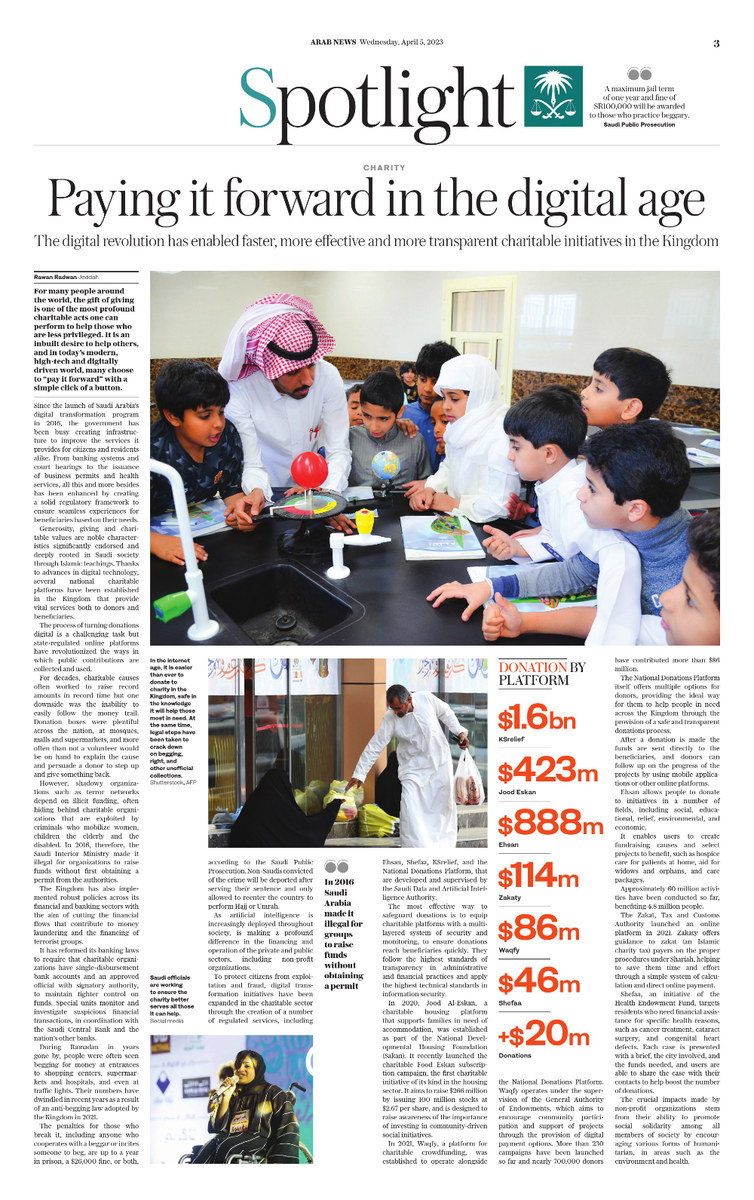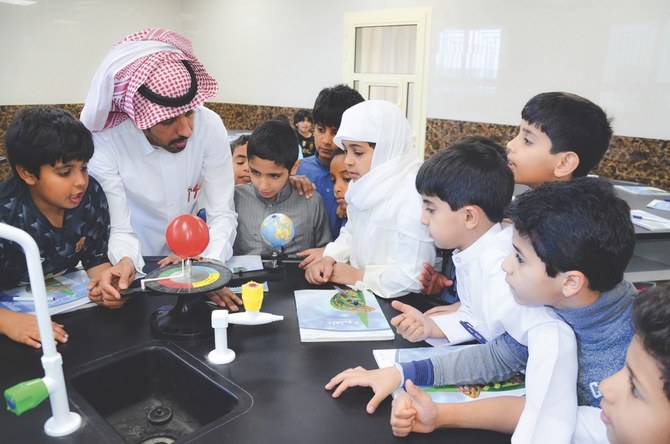JEDDAH: For many people around the world, the gift of giving is one of the most profound charitable acts one can perform to help those who are less privileged. It is an inbuilt desire to help others, and in today’s modern, high-tech and digitally driven world, many choose to “pay it forward” with a simple click of a button.
Since the launch of Saudi Arabia’s digital transformation program in 2016, the government has been busy creating infrastructure to improve the services it provides for citizens and residents alike. From banking systems and court hearings to the issuance of business permits and health services, all this and more besides has been enhanced by creating a solid regulatory framework to ensure seamless experiences for beneficiaries based on their needs.
Generosity, giving and charitable values are noble characteristics significantly endorsed and deeply rooted in Saudi society through Islamic teachings. Many people are invested in aiding others who are less fortunate and having a positive impact on society. Thanks to advances in digital technology, several national charitable platforms have been established in the Kingdom that provide vital services both to donors and beneficiaries.
The process of turning donations digital is a challenging task but state-regulated online platforms have revolutionized the ways in which public contributions are collected and used.
For decades, charitable causes often worked to raise record amounts in record time but one downside was the inability to easily follow the money trail. Donation boxes were plentiful across the nation, at mosques, malls and supermarkets, and more often than not a volunteer would be on hand to explain the cause and persuade a donor to step up and give something back.
However, shadowy organizations such as terror networks depend on illicit funding, often hiding behind charitable organizations that are exploited by criminals who mobilize women, children the elderly and the disabled. In 2016, therefore, the Saudi Interior Ministry made it illegal for organizations to raise funds without first obtaining a permit from the authorities.
The Kingdom has also implemented robust policies across its financial and banking sectors with the aim of cutting the financial flows that contribute to money laundering and the financing of terrorist groups.

Legal steps have been taken to crack down on begging and other unofficial collections. (AFP)
It has reformed its banking laws to require that charitable organizations have single-disbursement bank accounts and an approved official with signatory authority, to maintain tighter control on funds. Special units monitor and investigate suspicious financial transactions, in coordination with the Saudi Central Bank and the nation’s other banks.
During Ramadan in years gone by, people were often seen begging for money at entrances to shopping centers, supermarkets and hospitals, and even at traffic lights. Their numbers have dwindled in recent years as a result of an anti-begging law adopted by the Kingdom in 2021.
The penalties for those who break it, including anyone who cooperates with a beggar or incites someone to beg, are up to a year in prison, a $26,000 fine, or both, according to the Saudi Public Prosecution. Non-Saudis convicted of the crime will be deported after serving their sentence and only allowed to reenter the country to perform Hajj or Umrah.
In early 2022, the Ministry of Interior arrested an Asian woman who had collected more than $31,000 from begging. A Yemeni man was arrested for obtaining about $30,000 from worshippers at a mosque.
Though many unsanctioned collections are believed to have been for legitimate causes, it is undeniable that they come with a higher risk of fraud or illicit transactions. As artificial intelligence is increasingly deployed throughout society, is making a profound difference in the financing and operation of the private and public sectors, including non-profit organizations.
To protect citizens from exploitation and fraud, digital transformation initiatives have been expanded in the charitable sector through the creation of a number of regulated services, including Ehsan, Shefaa, KSrelief, and the National Donations Platform, that are developed and supervised by the Saudi Data and Artificial Intelligence Authority.
The most effective way to safeguard donations is to equip charitable platforms with a multilayered system of security and monitoring, to ensure donations reach beneficiaries quickly. They follow the highest standards of transparency in administrative and financial practices and apply the highest technical standards in information security.
In 2020, Jood Al-Eskan, a charitable housing platform that supports families in need of accommodation, was established as part of the National Developmental Housing Foundation (Sakan). It recently launched the charitable Food Eskan subscription campaign, the first charitable initiative of its kind in the housing sector. It aims to raise $266 million by issuing 100 million stocks at $2.67 per share, and is designed to raise awareness of the importance of investing in community-driven social initiatives.
In 2021, Waqfy, a platform for charitable crowdfunding, was established to operate alongside the National Donations Platform. Waqfy operates under the supervision of the General Authority of Endowments, which aims to encourage community participation and support of projects through the provision of digital payment options. More than 230 campaigns have been launched so far and nearly 700,000 donors have contributed more than $86 million.

Saudi officials are working to ensure the charity better serves all those it can help. (Social media)
The National Donations Platform itself offers multiple options for donors, providing the ideal way for them to help people in need across the Kingdom through the provision of a safe and transparent donations process.
Through the platform, donors can select a project and information is provided to give them a better understanding of the work it carries out, the amount of funding it needs for this, the number of beneficiaries, the individuals that benefit (such as the elderly, families without support, people with special needs, widows and orphans, or mosques), and more besides.
After a donation is made the funds are sent directly to the beneficiaries, and Donors can follow up on the progress of the projects by using mobile applications or other online platforms.
Ehsan allows people to donate to initiatives in a number of fields, including social, educational, relief, environmental, and economic. It enables users to create fundraising causes and select projects to benefit, such as hospice care for patients at home, aid for widows and orphans, and care packages.
Approximately 60 million activities have been conducted so far, benefiting 4.8 million people.
The Zakat, Tax and Customs Authority launched an online platform in 2021. Zakaty offers guidance to zakat (an Islamic charity tax) payers on the proper procedures under Shariah, helping to save them time and effort through a simple system of calculation and direct online payment.
After payment is made, the money is transferred to the Social Solidarity Fund at the Ministry of Human Resources and Social Development, where more than $114 million of zakat has been paid by 171,000 people and distributed to beneficiaries.
Shefaa, an initiative of the Health Endowment Fund, targets residents who need financial assistance for specific health reasons, such as cancer treatment, cataract surgery, and congenital heart defects. Each case is presented with a brief, the city involved, and the funds needed, and users are able to share the case with their contacts to help boost the number of donations.
The crucial impacts made by non-profit organizations stem from their ability to promote social solidarity among all members of society by encouraging various forms of humanitarian, in areas such such as the environment and health.
The Kingdom’s Presidency of State Security has warned citizens and residents against donating to strangers. It advises people to donate only through authorized and official channels, and to report anyone involved in begging by calling 911 in the Makkah and Riyadh regions, and 999 in all other parts of the Kingdom.


































